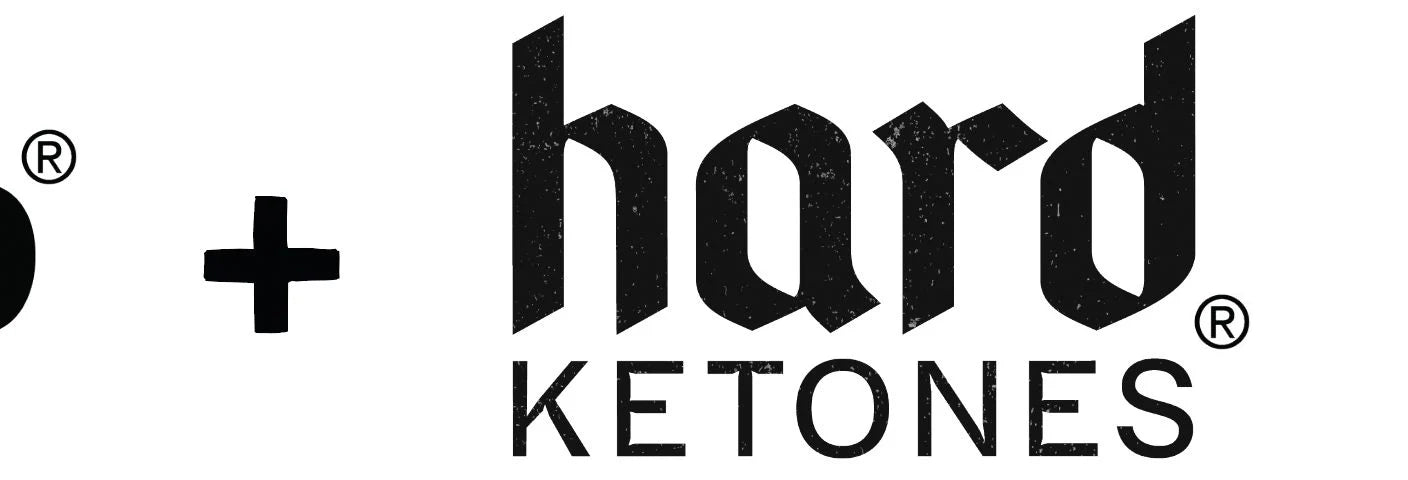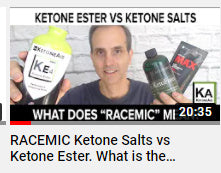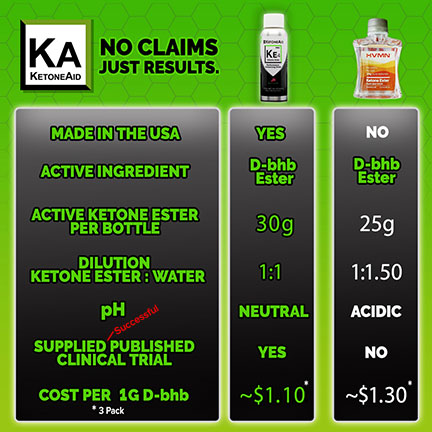Ketone Ester Vs Ketone Salts, comparing Exogenous Ketones
When a person does a multi day fast, or a ketogenic diet, their body will go into fat burning mode, called ketosis.
Defining "Ketosis" is utterly confusing and even the scientists didn't understand the confusion they would create with creating new terminology like "nutritional ketosis" (sounds more clear, right? with food, like a keto diet? Nope!).
There are 2 ways to define ketosis (more in this video).
1) Circulating ketones (also known as BHB) in the blood. Test your blood using a ketone blood meter to prove the ketone levels have increased.
2) Where your body burns fat to make ketones flow into the blood stream.
Enter "Exogenous Ketones"
This is where ketones are consumed externally, think a drink. Problem is many companies try to market their product and claim "enter in ketosis in 60 minutes." Depending on which terminology they are referring to it isn't a complete lie. If you mean #1, circulating ketones, sure it does that. The problem is when people hear "ketosis in minutes", 99% of consumers think "I drink this, I burn fat". Which is TOTALLY wrong or misleading. It actually SKIPS fat burning!
So it is more accurate to call it Endogenous Ketosis and Exogenous Ketosis.
So within the category of "Exogenous Ketones" there are currently 2 main subsets. Ketone Salts and Ketone Esters.
- Ketone Salts
- Racemic Ketone Salts. This is the most common product sold. It is almost 100% of the time sourced from China. Even if they say "Made in the USA". There is a trick that companies use where they move it from a bag from China to a tub in the USA and call it "manufactured" in the USA. Yes, moving from bag to tub is a manufacture. This product is commonly sold on Amazon with 100s of products claiming to have ketones in their drink. The problem is that only 50% of this product is bioavailable. Half of it can't create energy. Yes it still has DOUBLE the salt load to buffer the acid. The total salt load is through the roof. Upwards of 4 grams of salt a day. Sure you can get keto diet pills that were NEVER on Shark Tank, that are in pill form, but the amount of ketones delivered is next to nothing.
- Non- Racemic Ketone Salts, or D-BHB. These are much more expensive to make and harder to find. If you aren't sure if your product is the D form, it is NOT, because no manufacture will sell a product that costs them much more and not brag about it. Only a few companies sell them. Many of them are 80% the D form, which is better than nothing. Other companies will hide the amount of ketones in a "proprietary formula" calculation and then fill it with a ton of other fillers so the "total" looks higher than the next guy. Ketone salts aren't inherently bad. But even the non racemic, the salt load might be huge and imbalanced. But if riding in 120 degree heat and you already need 2-4 grams of salt, sure, go for it.
2. Ketone Ester.
Mainly D- BHB/D 1, 3 butanediol or Ketone Monoester. This is the molecule that 95% of the scientific community uses for their research and is commercially available. The ketone salt companies will point to these studies to prove ketones work, but it was a drastically different molecule. Most ketone esters (currently) combined the D form of BHB with something called D 1, 3 butanediol instead of a base (salt). This allows one to take 10x more if they wanted to, without the salt restrictions. Many confuse things by thinking the esters are more expensive, when they are not. Just because they can increase blood ketones 10x more, but cost 8x more, it can be MORE cost effective on a cost per 1mm rise in blood ketones, if that is your goal. The downside is the taste. It used to be vomit educing (see Peter Attia Tim Ferriss podcast), but now it is made a different way, naturally through fermentation and with flavor masking and dilution, isn't worse than a shot of ginger.
Other exogenous ketones.
- MCT, specifically C8 coconut oil. About 15% of this molecule will go through the liver and make ketones. This is how 1,3 butanediol works (but at 70%). So MCT and 1,3 are very similar, but with 5x more calories. C8, the strongest of the MCT oils may take weeks to build a tolerance to move your blood ketones up enough. Otherwise you get massive stomach cramps. See my wife after taking too much. And is nicknamed "Disaster Pants Diet" because of... you guessed it. MCT does mix well with Ketone Salts, it does NOT mix well with Ketone Esters (see FAQ).
- Acetoacetate/ Racemic 1,3 butanediol. Or Ketone Di-ester (sometimes confusingly called ketone ester) This molecule is not commercially available. It is what most of the research from Dom D'Agostino. Time will tell which molecule is better for what. I believe both may have a place.
- Free Acid BHB. This is where the ketone salt has the salt extracted to put it into the "free acid" form. One can make a racemic or D form (racemic is cheaper). This alone may not work because the PH will be too low, but it can be combined with other exogenous ketones to be PH balanced and it tastes better than the ester. This is what is in the KetoneAid KE1 and SnakeWater products.
We don't even think it is a battle when comparing racemic ketone salts to ketone esters. Many report first trying the salts and they don't work (unless it is because of a salt shortage while entering a keto diet, but you can save money just buying salt pills). KetoneAid is of coursed biased, because we only sell the more pure D form of BHB as a Ketone Ester, D BHB Ketone Salt and D BHB Free Acid. But ask almost any biochemist if they would consume the natural D form or a chemical form that is foreign to the body.
Explore much more about how Ketone Esters work and don't work on our Youtube channel. And subscribe.
Frank LLosa
CEO KetoneAid




